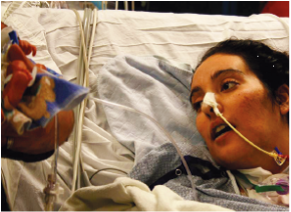 Noah Matthew was born on a rainy winter day in 2009, Pearl Harbor Day to be exact. We jokingly surmise that it was Noah’s way of warning us that it would most definitely be, ‘a day that would live in infamy’ for more reasons than one. My pregnancy and Noah’s birth were not like many others of his preemie friends. I, of course, did what any neurotic first-time mother does, including making a playlist of songs I would like playing in the delivery room, putting headphones on my tummy with Mozart blasting to aid his brain development, reading every single pregnancy book, and anxiously awaiting the arrival of our first child. Our plans took a tailspin at the end of October 2009 when I contracted the deadly H1N1 flu (swine flu) at 24 weeks pregnant. After a very unfortunate initial misdiagnosis at a local urgent care facility only a couple days after the onset of symptoms, I entered the hospital emergency room, and, unbeknownst to me, was already in very critical condition. After being rushed back to triage and following a flurry of activity that included multiple IV lines, a breathing mask, and several medications, my vitals continued to decline. The doctors instructed my husband and me that it was in my and our baby’s best interest to be placed in a medically induced coma for a couple days to allow my body to get some rest and not work so hard to breathe. A couple days turned into weeks, and I woke up almost two months later as a new mom to a very tiny preemie baby. Over the course of six weeks, I was on a ventilator, got a massive blot clot, went into renal failure, and eventually had to have a tracheotomy placed to help me breathe on my own. As I began to wake up from being weaned from the paralytics, Noah started experiencing heart decelerations, and the decision was made to deliver him via emergency C-section at 29 weeks and five days gestation. I regained full consciousness the evening following his birth. With the help of my husband and our nurses (and with my arms being propped up on pillows because my body was so atrophied from lack of movement for almost two months), I was able to ‘hold’ my son. That was and always will be one of the best moments of my life. Noah spent the next three months in the NICU, dealing with issues ranging from a close call with NEC (necrotizing enterocolitis), lung and breathing issues requiring extreme oxygen support, Gastroesophageal reflux disease (GERD), ROP (retinopathy of prematurity), growth issues, anemia, which required several transfusions, as well as hernia repair surgery in his umbilical and groin areas. In comparison, our journey in the NICU was, for the most part, uneventful when you think about everything Noah endured while in utero. He was exposed to drugs that could have made it impossible to survive, or at the very least cause brain damage. I never thought there would come a day when I would ever say that I was thankful I went into complete renal failure, but I am because my blood was being cycled out of my body and scrubbed clean 24 hours a day, seven days a week. Because of this, Noah received only very residual amounts of those toxic drugs. The post-traumatic stress I experienced in dealing with my own mortality and subsequent paralysis in my right foot, made things that much more stressful and still stays with me in some ways today. I had to struggle with the notion that I was no longer this strong, independent, capable person I had been before. Instead, I counted my blessing as I sat in a wheelchair beside my son’s incubator. And again when I held onto a walker to be able to watch my husband change my little two-pound son’s diaper. How would I ever be able to take care of this fragile human being who depended on me for his life when I could barely take care of myself? You sit there in a room with beeping monitors and flashing numbers on a screen that act as a constant reminder that your tiny little baby is not like all the others. One of the most difficult things in the NICU is seeing other babies and their parents who got there after you did leave before you. I can’t tell you how many times I looked over at my husband and thought, “Why not us?” Our chance of survival was less than 10 percent, but we were able to defy the odds. With the help of modern medicine, through many prayers, and by the grace of God, we became miracles. To say that I have learned to look at life and tough situations very differently would be an understatement. Despite all the anxiety, fear, and sadness, we experienced the most special and rewarding memories. The relationships and bonds we made with the nurses, doctors, and fellow NICU parents are as strong as they were all those years ago. We don’t take things like our health and waking up every day for granted anymore. We know, beyond the shadow of doubt, that the miracle of birthing a healthy child is a blessing. And most of all, we are so very thankful for all the nurses and doctors and organizations like Miracle Babies who were there for us during one of the scariest times of our lives. If there is a support group you can join, or a way you can give back to those in the shoes you filled not so long ago, I encourage you to reach out and do something. Miracle Babies has afforded us opportunities to do just that. There is no way to be able to say thank you enough. We are forever indebted to them and the wonderful life they breathe into this community and this family of NICU warriors. Veronica Pacheco Abstract taken from “Miracle Babies guide and journey though the NICU.” Written by: Sean Daneshmand, MD and Susan Newman, MSN, RN, NNP-BC 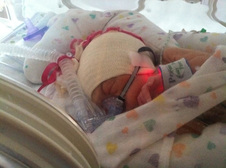 When you are a parent of a NICU child, your hero or heroes sit before you every day. Much like a fireman saving you from a blazing fire, my children saved my life. They saved their own lives and they are only 4 years old. They fought battles and won. We are a family of warriors. I have become a very strong woman, an extremely proud and devoted mother, and a person that is grateful for each passing day. I try my best to thank God for my children because I saw miracles happen right before my eyes. I go about my day as all other people do and I have my simple challenges and my crazy moments. I deal, I move on, and I live my life. Not everyone knows I am a NICU Mom, but I know that it makes a difference in the woman I am each day. Every day I think of our journey at least once; every night while watching my children sleep, I thank God that they are here with me. We are a family of warriors. I think we all live a fairly normal life, but our experience in the NICU plays a huge role in my everyday. All five of us have both external and internal battle scars. My husband and I have memories that could most likely be compared to those suffering from post traumatic stress disorder. Sometimes, when a friend mentions anything related to a hospital experience, without invitation I immediately start telling my story and give details about my children’s stay at the NICU. The memories come flooding back and my mouth starts speaking even before I know what I am saying. I think most of my friends have heard my stories, but they just allow me to talk because it is polite and because they love me. We are a family of warriors, but I am forever fragile from this experience. We are a family of miracles. Even though I am tougher than I was before the NICU stay, I am still as fragile as the second the doctor told me 30%. He told me that 30% of the children with my son’s condition do not survive. I am still as fragile as the second that the social worker asked if we would like to see a member of the clergy. I am fragile as the time I was holding my breath when my son’s ventilator was removed for the first time. I am as fragile as the time that they took my son to the operating room in an isolette when he weighed less than 5 lbs. Even though I am tough, even though we are warriors, I am forever fragile because I know that life is fragile and I know that every second with my children should be cherished because they were gifts given only to us. 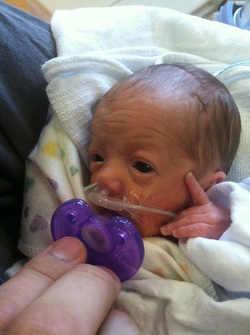 All that being said, I am a regular mom. I live a regular life and I think regular thoughts for most of my days. I have the occasionally slip ups every now and then, but it’s not easy being a mother and it is not easy having triplets. People often ask me how I do it, and I know how I do it. I do it because I would never want to do it any other way. I need these three children like I need air and I know that I am not perfect but they have made me who I am and have showed me that they are willing to fight for me. I will fight for them every day. Like any mother, I have to discipline them and teach them how to be respectful and loving children, but how do you teach the fireman who saved your life how to fight a fire? Every time I become frustrated with my children, the NICU flashes like lightening over and over again in my brain. “Be thankful for those children, they fought so hard to be with you.” I can get over much of what the NICU imprinted on my soul. I can forget the horrible moments easily and move on because I have my children with me. There are a few things that my body and soul will truly not ever let me forget. Whenever I am in a doctor’s office or a bathroom or in the ER with my daughter when she gets croup, I have a hard time getting up the courage to wash my hands. As we all know, hand washing in a hospital is necessary and 100% disgusting if not done. However, the smell of the hospital soap brings back every fear and and every memory I ever had at the NICU. The smell makes me remember how terrified I was of every germ and how even the smallest virus or cold could make a huge difference in the lives of my children. I remember using hand sanitizer at least 100 times a day, and I washed my hands before entering the NICU until my skin was raw. I kept my cell phone in a baggie tucked in a sanitized bag. I clean every inch of my home when the babies came home and every person that came near them had ALL vaccines. I put signs on their carriers that said “DO NOT TOUCH ME”. I was scared to death every second of every day. I am a warrior, I am fragile, and I am a NICU Mom through and through. I have the guilt of not carrying my children to term. I have the memories of each roller coaster moment from all three of my children’s 94 day hospital stay. I have found strength in the eyes of my babies, and I have learned to be compassionate for all. The NICU is like the teacher of a class you never wanted to take. It gives you lessons that you will remember forever. Many of my memories from the hospital stays are horrible but I have a few that are great. I am forever thankful for the nurses and doctors that raised my children for those three months when I could not. I will never forget the names or the faces of the nurses and doctors that saved my son’s life especially. I know who you are, I know where we were standing when you told me the news, and I remember the love you showed me. I have met countless heroes along the way and I think I can honestly say that I am grateful for this crazy journey. When leaving the hospital with my third child a neonatologist said to me “Ya know, one thing I learned about the NICU is that every person’s journey affects them the same way. Whether you are here for one day or nine months, all parents are affected. The fear that you have is the same.” Here’s to all my fellow NICU Mamas. We are all warriors. We are all fragile and each of our journeys is our own. Do not feel weak when the smell of the soap brings you to you knees. It is just God’s gentle reminder that we should continue to be grateful for the wonderful gifts in our lives. 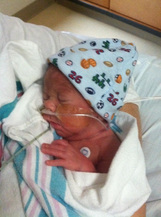 --- About the Author: Heather S. is the Mom of three miracle triplet’s Savannah, Max and Lillyana. They were born at 28 weeks 1 day and spent over three months in the NICU. Her son was transferred to AI Dupont Hospital For Children’s NICU at just 13 days of age where he received several life saving surgeries. Her triplet’s just turned 4 years old in August. Heather has been generously giving back by volunteering with Precious Kisses, a division of Project Sweet Peas based in the Philadelphia area. She and her family, friends, colleagues and school students have be helping support families with babies in the NICU at Nemours Alfred I. duPont Hospital for Children. She strongly believes that helping others promotes healing. 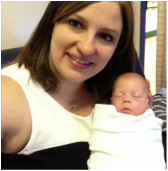 Having a child in the NICU is a stressful situation. Here are some ways you can cope with this stress. Take care of yourself: You can’t take care of someone else if you don’t care for yourself first. Build a support system: It may be difficult to feel connected to family and friends if they have never had a baby in the NICU. It is important for you to find people who can relate to you and this unique experience that you are going through. Check with your hospital to see if they have a NICU support group for parents. If a support group is not offered at the hospital try to find an online support group so you have people to talk to who understand what you are going through. Get Sleep: This seems pretty basic, but sometimes it is hard to do when you are worried about your child. Make sure to try and get 6-8 hours of sleep per night because sleep is important to help your body and mid recharge. Exercise: Exercise is a wonderful stress relief and is super important to your overall health. Make sure you ask your doctor what types of exercise you can do if you have just had your child because there may be some restrictions. Eat Healthy Foods: When you are traveling back and forth to the NICU it may seem hard to eat healthy, but eating healthy will make you feel better. Pack healthy snacks (like fruit, granola bars, and packets of oatmeal) that you can eat easily while at the hospital. Accept help: If people offer you help, take them up on the offer. Websites like mealtrain.com and lotsahelpinghands.com can be great at keeping all the people who want to provide you help organized. Ask people to do laundry, take you to the hospital, make meals, or even care for older siblings while you focus on caring for yourself and your new child. Journal: Being able to expressing your feelings on paper can help you cope with them. The journal can also help remind you of what your baby has accomplished and how far they have come since being born. Relax: Spend time away from the NICU doing things that you enjoy, such as taking a walk, going out for dinner, reading a book, meditating etc. You may feel bad if you don’t spend every moment with your child, but they are being well cared for at the hospital. It is important that you take time for yourself to try to relax. Therapy: If you are feeling overwhelmed you may want to seek professional help. A therapist can help you understand everything that you are going through and help you to understand your feelings. A huge benefit therapy is that its effects are long-lasting. It allows you to work through problems and develop the tools you need to help you deal with issues in the future. 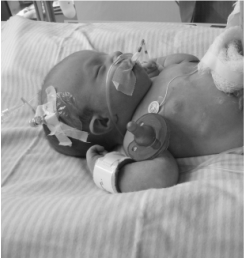 "Gastroschisis is an easy fix” “If you had to pick a birth defect, gastroschisis would be the one.” “Once we close the baby up and you go home, you have nothing else to worry about.” These were the responses from practitioners seven years ago when at 12 weeks we found out our son, Avery would be born with gastroschisis. Now, seven years later, our foundation gets 1-2 families a week getting this same input from their physician. And it does not end up being true. Gastroschisis is one of the more visceral birth defects in the world. The defect is a hole in the abdominal wall that can range in size that causes the intestines, and sometimes other organs to protrude out of the body. The medical community does not know what causes the abdominal wall to not close down completely around the umbilical cord as it should in normal development. The survival rate is 80-90%, with about 40% experiencing long-term complications across a spectrum. The trends are on the upswing too- state side 1990 it was 1 in 10,000. Then in 2011 it was 1 in 2229. Earlier this year the CDC reported that in 14 states, there was a 30% increase in the disease across all demographics. However, gastroschisis is a rare disease. A rare disease is defined as a disease that affects less than 200,000 people at one time. The CDC reports that 1,871 babies are affected by gastroschisis a year. Which frustrates research- trends are up, but the sample sizes to study are very small. This might sound like a lot of numbers to you, but they really mean everything to our population. When you are one of 7,000 rare diseases it means that the knowledge (much less correct pronunciation) on gastroschisis is not going to be pervasive. Initially, it means our expecting parents will have to travel cities away, some even states away for their child’s initial treatment at birth. That stay could be 3 weeks (on average about 6-8) or 740+ days. Being a rare disease also means our parents cannot walk into their local Urgent Care with a child who has a compacted bowel, fever or vomiting, and find a practitioner that has had experience treating a gastroschisis affected gut (and believe me, that does matter.) For any other child, vomiting and fever would normally mean a bug, for our children it could mean intussusception, volvulus, or obstruction. Things most doctors rarely see. Simply put, gastroschisis means there are no road maps. To test this "easy fix" idea, Avery’s Angels recently asked some of it’s 12,000 social media followers to submit a simple sample: 1) Baby’s Name 2) Date of birth 3) Date until first hold 3) Days in the NICU 4) Number of Surgeries 5) Any long term complications. We have had over 200 responses and no 2 are alike. Some families went 2-3 weeks before first holding their child, while others were in the unit and discharged in that time. Some babies had little complications after discharge, some have spent upwards of 15 years in and out of the hospital. Out of the 200 submissions, no 2 were the same. And, as one parent put it, none of the experiences were “easy.” With this in mind, that I could not speak about one experience for all, I asked our families to weigh into this piece. What would you want the world to know? What would you want an expecting family to know? The overwhelming consensus was this: Expect anything. Outcomes cannot be promised. This defect is not an "easy fix" no matter what you get handed. You never get to “leave it behind,” you’ll watch every poop, fever and vomit with caution, and with good reason. Don’t consult Dr. Facebook, know where your knowledgeable physician is, find that person and build that relationship. Ask questions. If you have to, ask the same question over and over. You’ll be terrified at some points, and that is OK. You find out that you have a strength in you that you never knew you were capable of, and sometimes your child will lead you through that as they endure their trial. When you need to, seek support from the gastroschisis community. Even though every journey is different, there is commonality in the journey still, and it helps to know you’re not alone. The “easy” part of gastroschisis is the love that comes, unconditionally, for a tiny baby born inside out, that teaches you how to love from the inside out. There is an amazing and fiercely loyal tribe of gastroschisis families and survivors that have come together over the years, to support one another, to help others get to the right people who can help. These are the parts where good starts to shine through. When you cannot have a road map as to where you are going, it helps to have a tribe to walk with you along the way. We have a lot to accomplish, and an uphill climb. Gastroschisis is a rare disease, meaning the science behind understanding the disease is going to take a lot of time and effort. It means that the skill set to treat this is going to be rare too. I am not worried about it though, because the families I get to serve, the patients I get to work with- survivors and angels, are relentless. The push to make up the gaps in understanding comes with a tenacity that cannot be paralleled. Some of our moms and dads even start up a new career in medicine as nurses, CNA’s, doctors and paramedics. Even more of them take up the charge to promote awareness and research. Nearly all of them turn around to give a helping hand to others struggling through. No, no one would chose this defect. But anyone would chose this tribe. Written by: Meghan Hall CEO/Founder Avery's Angels ® Gastroschisis Foundation www.averysangels.org 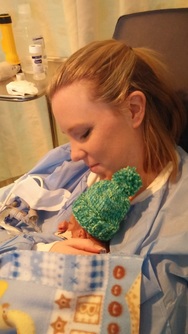 I was exactly 23 weeks pregnant when I was at work and went into active labor. As an ER nurse, I knew that the outcome of babies born this early more likely than not was not a good one. The two days I was on bed rest were filled with terrifying discussions about "viability" and the low percentage that my child would even survive outside of the delivery room. At the hospital I was admitted to, babies born at 23 weeks and 4 days had at least a sliver of a chance. Any babies born before that were too small and too premature. After two scary days on bed rest, I was rushed into an emergency c-section. My labor had progressed past the point of no return. I don't remember much from my time in the delivery room, but I do remember hearing a nurse shout, "the baby's moving!," being told it was a boy, then giving him a quick kiss before he was rushed to the NICU and placed on a ventilator. Ryan was born at 23 weeks and 3 days, technically not a viable baby. He weighed 1 pound, 5 ounces. Ryan spent weeks after that fighting for his life. Because he was so early, his lungs were so underdeveloped and kept shutting down. The first few weeks he was so sick and fragile he couldn't be repositioned in his isolette. His airway was so tiny any movement could dislodge his breathing tube and he wouldn't be able to get oxygen. We sat by his isolette day and night, holding our breaths every time his heart rate dropped or his oxygen plummeted. At one point a few weeks in, Ryan's lungs continued to shut down. The doctors threw everything they could at him and he wasn't improving. The neonatologist gave us the possibility of the grim outcome, and promised to do everything they could. We prepared for the worst scenario, but the whole time Ryan kept kicking away in his isolette and fighting harder than anyone could imagine. Miraculously, Ryan turned the corner and pulled through. His lungs were still precarious, but every day began to look better and better. After 3 weeks, he was finally stable enough that I could hold him. Holding his tiny, less than two pound body against my chest was the best moment I could have imagined. Ryan spent 9 weeks on a ventilator before he was able to be weaned off and onto oxygen. Multiple times, he pulled out his own breathing tube. I watched him turn blue and lifeless as they struggled to get him breathing and reinsert his tube more times than I can count. Finally, one day Ryan decided enough was enough, pulled out his tube, and never looked back.
He then spent weeks on Bipap, then CPAP, then high flow oxygen, then a nasal cannula. He had to be transported to another NICU for laser eye surgery for retinopathy of prematurity. Every day he fought, and grew, and exceeded the expectations of all of the medical staff. Finally, after 146 days in the NICU, exactly one month after his due date, Ryan came home for good. No oxygen, no monitor, and no long term issues to be had. As I sit and type this, the miracle baby that was not supposed to make it out of the delivery room is smiling and laughing away. We are forever indebted to the NICU doctors, PAs, APRNs, nurses, and staff for everything they did for Ryan and fighting as hard as he did for the best possible outcome. I'm currently in graduate school to become an APRN myself, with the hopes of working in the NICU upon graduation and pay it forward to more tiny, incredible miracles like Ryan. Written by: Katie Vigil, mother of Ryan 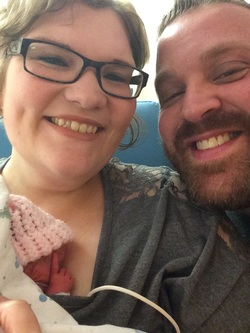 Jennifer Labriola used to envy those whose life was a neat little package. Effortlessly their life was textbook, fairytale normal. How it’s supposed to be or what they thought it should be. Jennifer’s journey through life has been overcoming hurdles – she is a reporter at heart and research has always been in her wheelhouse. When she couldn’t get pregnant, she researched infertility. When she found her insurance wouldn’t pay for it, she researched and questioned nurses about how she could save. Finally, after eight years, they put in two embryos in May of 2014, with the cautious, “Two? Maybe they should only do one” questioning of her husband, Carlo. After years of negative pregnancy tests, she finally was pregnant, and not with one baby, but an overachieving two babies (both girls). Finally, she thought, she could start up the normal part of life, with a normal pregnancy, right? At 24 weeks during an ultrasound the doctor told her they had a problem. She chuckled, thinking he was joking, but no, her “baby b” had intermittent absent blood flow. She was growing very slow, while baby A was doing fine. She struggled for weeks, praying to get to at least 28 weeks. The doctor kept a close eye on the babies and each time she arrived to her appointments he would joke if she’d “packed her bags” for the hospital. “No, not yet,” she’d say with a smile. Positivity was what she clung to during these stressful times. Jennifer and the girls finally arrived at 28 weeks and during one appointment, the baby’s brain, which was being affected by the cord issue, was beginning to show normal readings. This sounded great, but the doctor looked concerned and said, “we’re having some babies today.” Normal brain function, means the baby was giving up. We had 48 hours to remove them, or else we’d lose baby b. Patience Lucia (baby a) and Aria LaSalle (baby b) were born on Oct. 26, 2015 at 6:03 and 6:08pm via c-section. Patience, the bigger of the two, came out crying at 2lb 8oz. Aria came out with a soft cry, and weighed 1lb 10oz. She got a quick peek of the babies, but all she could remember was seeing Patience in a plastic bag and thinking how odd it was. Their journey was just beginning, with hesitant congratulations, and an uneasy feeling from family and friends. She never once felt that the girls wouldn’t survive, she was 100% positive that they would be just fine – they were strong babies even if so tiny. The day she got to see them she thought it would be a life changing moment, but it was more of a numbing, overloaded moment. She was overloaded with the NICU nurses crash course in the norms of their new NICU life. Wash your hands before you touch them, don’t rub their skin – it’s too sensitive right now, and be sure to talk low. It was a lot to process at one time and as she looked at the other babies and compared their weights to to the others, she realized they had the smallest babies in the NICU. They got lucky. Their girls only had minor issues such as jaundice and both were on low-flow cannulas. A perk of having babies in the NICU is learning medical terms, in a constant state of being overwhelmed they constantly learned about the babies. They got to know the nurses, got to learn which ones they liked and spoke with doctors about care. She never asked when the girls could come home. After a while, their weeks and days were the same – they would spend weekends at the hospital. Eat in the cafeteria, day dream about when the babies would come home. Celebrate their milestones, they soon had feeder/growers – and just like what the NICU nurses told them, it would happen fast for the girls to come home. Patience came home first – the day they picked her up, was a stressful bittersweet day. She was happy and yet sad to have to leave her sister Aria there for another week. Patience came home on January 2 while Aria came home on the twin’s due date on January 13. Now with both girls are home, it’s been a rollercoaster of doctor’s appointments for their development. They are good babies, with personalities and smiles and giggles that is music to their ears. Being NICU parents, she knows they have a long road ahead of us with making sure the development of the girls is on track. She always wanted a normal type of life, but now, she couldn’t imagine her life any other way. Her babies are different, they are special and she is blessed with each milestone they reach. |
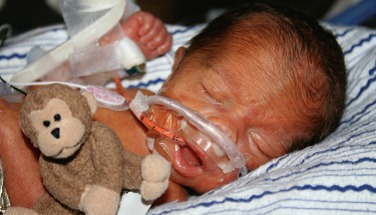
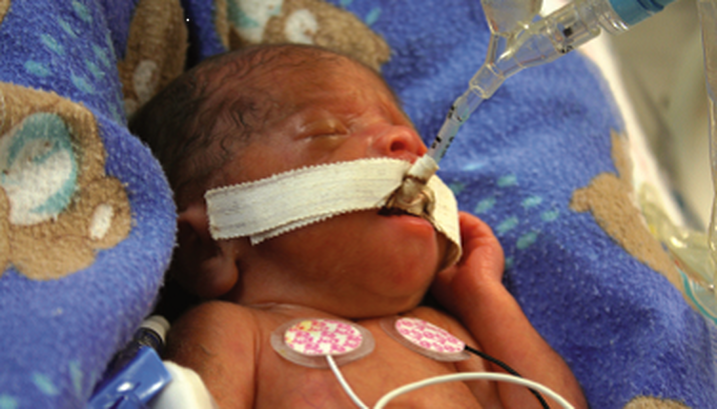
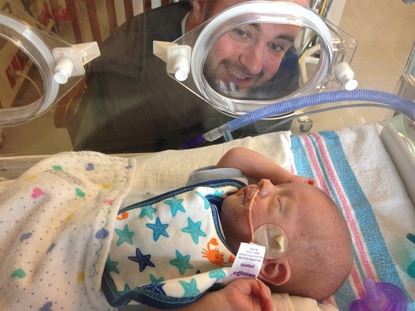
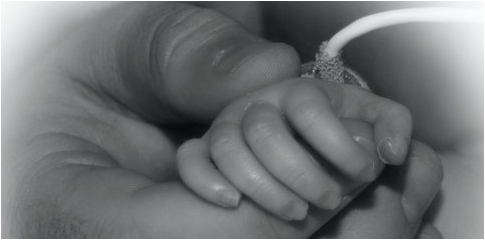
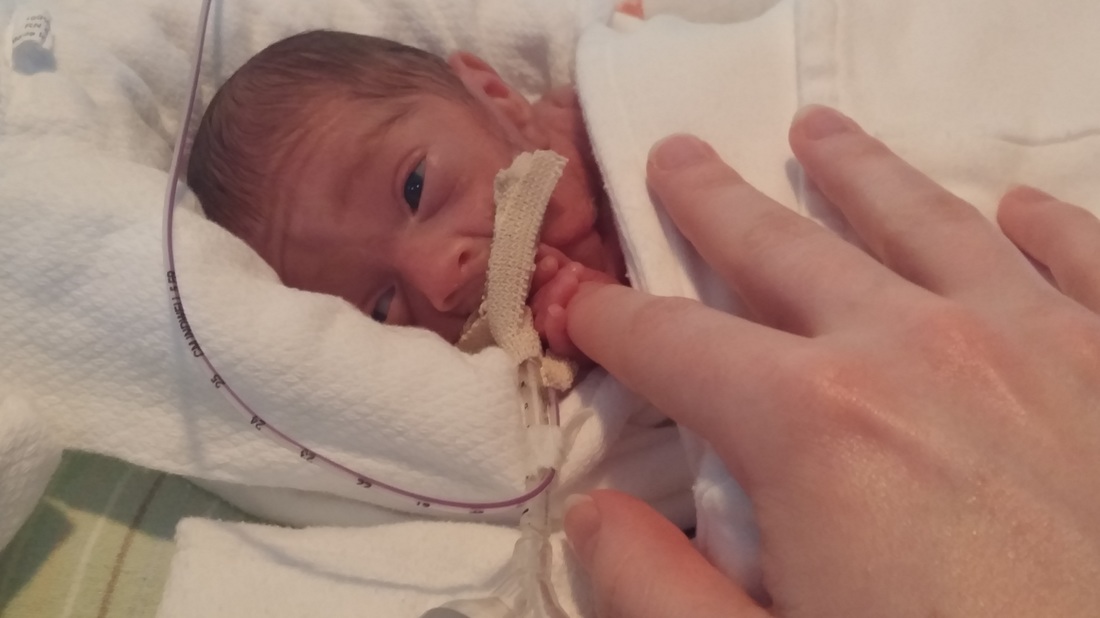
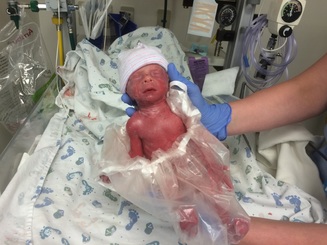
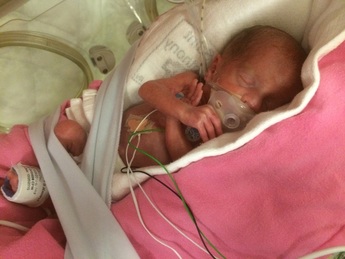
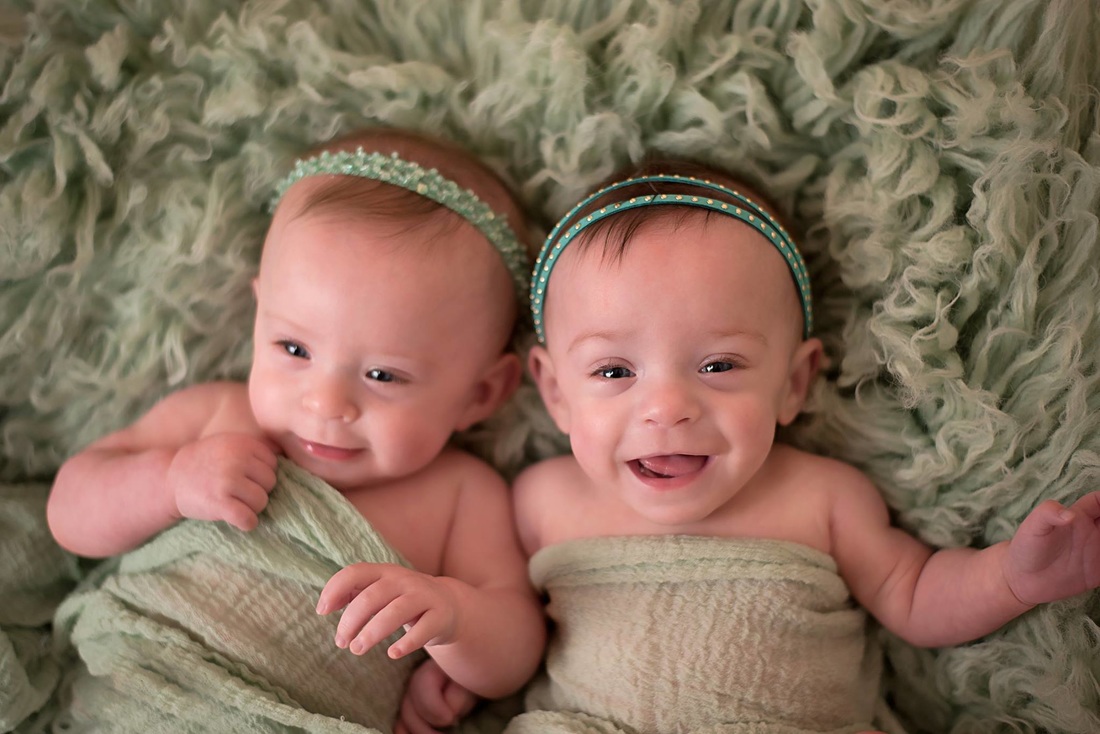
 RSS Feed
RSS Feed